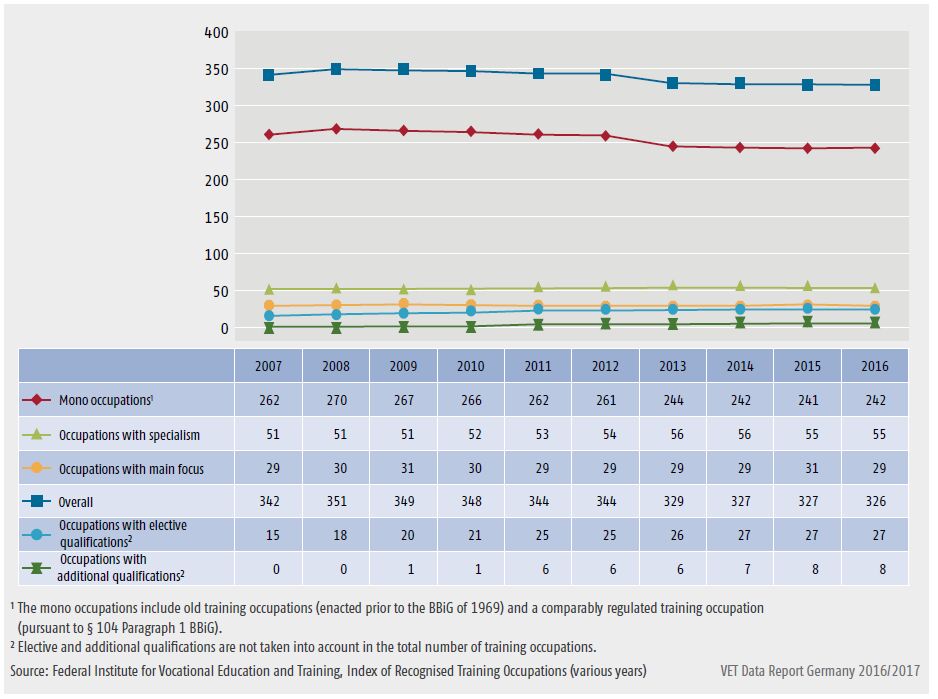Programmes in Germany
There are over 320 recognised training occupations in the dual apprenticeship system; their content and structure are jointly agreed among VET stakeholders. Most of these are of three years’ duration, and the majority are so-called mono occupations.
Programmes and duration
In the 2021 training year, there were 324 government-recognised training occupations under the Vocational Training Act (BBiG) or the Trade and Crafts Code (HwO). The number differs slightly each year due to the modernisation or creation of training occupations. 132 training occupations have been newly created or modernised since 2009. A general trend over the last years points to a decrease in numbers of training occupations. Standards are being merged and optional qualifications introduced to cover emerging needs on the labour market and adapt to digitalisation in the world of work. Most of the programmes for training occupations last three years, whilst a few have a duration of two years or three and a half years. The occupations of three years and more are mapped in the German and European Qualification Frameworks at level 4, the two-year occupations at level 3. Almost all of the two-year training occupations offer a clear progression route to a determined training occupation with a longer duration.
Training is carried out at different venues which usually include the in-company training, the school-based teaching and in some cases the inter-company training centres or similar venues. The apprentices spend three to four days a week in the company. It is also possible to alternate blocks of several weeks’ duration. The coordination of the relevant training and teaching activities is ensured on the basis of the training regulations and is described under Training and Teaching.
Structure of training occupations
There are no binding criteria on the structuring of training occupations. Structures following different patterns have developed over time. Most occupations remain so-called mono-occupations as opposed to occupations structured in accordance with specialities and main focus areas or those including qualifications units. Specialisations are mostly offered in the second and third year of training. Some occupations also allow training companies more flexibility through optional or additional qualifications.
Figure: Structure of recognised training occupations 2007 to 2016

Source: Data report on VET 2016/2017
Training outside the dual apprenticeship system
The dual apprenticeship system does not cover all sectors of secondary vocational education in Germany. For example, many social occupations such as social assistant are part of the full-time vocational school system of the Federal States. Most of the occupations of the health sector also have their legal basis outside the Vocational Training Act.
The amendment of the Vocational Training Act in 2005 introduced an option for Federal States to declare full-time school vocational training programmes as equivalent to existing training occupations. Criteria include correspondence in scope and content and sufficient practical work experience. Graduates of those programmes are then entitled to register for the final exams in the relevant training occupation at the competent body.
Transnational mobility of apprentices and Advice
According to the Vocational Training Act, a learning stay abroad of up to 9 months is possible during training. Trainees can thus learn abroad for up to a quarter of their training period. If a stay abroad is carried out within the framework of § 2 para. 3 BBiG, it is a training measure outside the training facility (§ 15 BBiG). All rights and obligations under the training contract therefore remain in force for the time spent abroad.
According to the BIBB Data Report 2023, a mobility rate of around 7% was achieved in 2019; due to the Corona pandemic, there was a considerable slump in stays abroad in VET in 2020 and 2021. In the meantime, however, the figures are rising again to the previous level.
Extensive counselling on framework conditions, financing and placement of learning stays abroad is offered.
- Bretschneider, M./Schwarz, H. 2015: Bringing order to the regulations - A heuristic for the structuring of training occupations
- Zimmermann, M./Spillner, G. 2018: Management assistants for e-commerce – a new training occupation from 1 August 2018.
- Repertory of training regulations
- Stakeholders and procedures in the development of national training standards - a European comparative study
- Erasmus+ Nationale Agentur (EU-Mobility Programme, National Agency)
- Beratungsservice für Auslandsaufenthalte in der Ausbildung (Advice training abroad)
- Mein Auslandspraktikum (My placement abroad)
- EUROPASS (EU Portfolio)
- Ausbildung Weltweit (German Worldwide Mobility Programme)
- betriebliche Mobilitätsberatung (Mobility counselling from chambers)